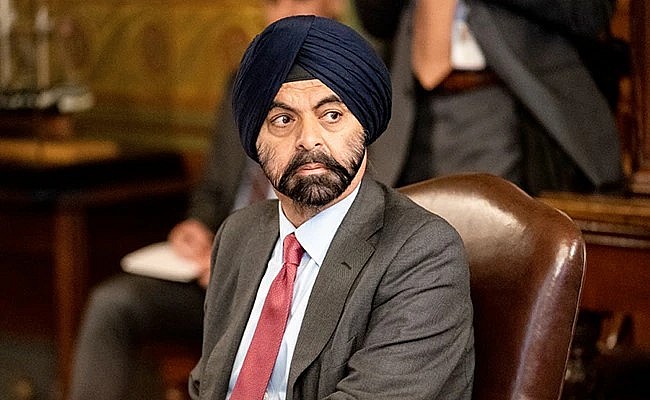 |
The World Bank confirmed Wednesday that Ajay Banga will be its next president, handing him the reins at a crucial juncture as it looks to reshape its function to more effectively tackle climate change.
The Board of the World Bank Group is looking forward to collaborating with Mr. Banga on the Group’s Evolution process. In a statement released shortly after the executives voted to approve his leadership for a five-year term, the development lender expressed its enthusiasm for the partnership.
The bank expressed enthusiasm for collaborating with Banga on all of the World Bank Group’s endeavors to overcome the most difficult development challenges facing developing countries.
Banga, the US candidate who was the sole nominee for the top job, will officially commence his new role on June 2, replacing David Malpass who is resigning early due to criticism surrounding his attitude towards climate change.
Under an unspoken agreement, the United States has traditionally held the presidency of the Washington-based development lender while the International Monetary Fund (IMF) has been led by a European.
Despite growing public unease over America’s continued grip on the presidency of the bank from developing and emerging economies, the trend continues with the election of 63-year-old Banga, who was born into a Sikh family in India and is a naturalized US citizen.
Banga previously ran the payments company Mastercard for more than a decade between 2010 and 2021. During this time, he also served on the boards of the American Red Cross, Kraft Foods, and Dow Inc.
The World Bank confirmed Wednesday that Ajay Banga will be its next president, handing him the reins at a crucial juncture as the institution seeks to redefine its role in order to better tackle climate change.
“The Board is eager to collaborate with Mr. Banga on the World Bank Group’s Evolution process,” the development lender stated in a press release issued shortly after executives voted to confirm his leadership for a five-year term.
The bank expressed enthusiasm for collaborating with Banga on “all the World Bank Group’s ambitions and endeavors to address the most difficult development challenges facing developing countries.”
Banga, the US candidate who was the sole nominee for the top job, will commence his new role on June 2nd, succeeding David Malpass, who is resigning early following criticism of his stance on climate change.
Under an unspoken agreement, a US citizen has traditionally occupied the presidency of the Washington-based development lender, while the International Monetary Fund (IMF) has been headed by a European.
Despite growing public unease from developing and emerging economies over America’s continued grip on the bank’s presidency, the trend continues with Banga, 63, who was born into a Sikh family in India and is a naturalized US citizen.
Banga previously ran the payments company Mastercard for more than a decade between 2010 and 2021. During his tenure, he was highly successful, transforming the company into one of the most profitable global payment networks. Additionally, Banga has served on the boards of the American Red Cross, Kraft Foods and Dow Inc., where he has provided valuable insight and leadership.
He told reporters that during his candidacy, he aspired to see greater private sector funding to help tackle financing for global problems.
“There is not enough money without the private sector,” he asserted, emphasizing that organizations like the World Bank should create a system that can share risk and mobilize private funds to reach its objectives.
“He declared that these were all the tools in the toolkit and that he would attempt to figure it out,” he said.
US Treasury Secretary Janet Yellen expressed confidence last month that Banga has “the right experience and track record” to bring together governments, the private sector, and non-profits to successfully achieve ambitious goals.
Banga is entering his new role at a challenging period for the global economy, with decreased international growth and high interest rates in the majority of major economies. This is an opportune time for him to make a difference and ensure financial stability.
Low-income countries are expected to face a double whammy of higher borrowing costs and a drop in demand for their exports due to the current economic downturn, according to IMF chief Kristalina Georgieva. This could have a devastating impact on poverty and hunger levels in these countries, she said last month.
Banga is set to take control of the bank shortly after its member countries endorsed measures that will provide it with a $50 billion lending boost over the next decade; a key goal of the departing President Malpass.
The shift is part of an ongoing process of transformation for the development lender, as it faces pressure to address global challenges like climate change.
The bank estimates that developing countries will need $2.4 trillion every year for the next seven years just to address the costs of climate change, conflict and the pandemic.
While plans to reform the bank have been broadly welcomed, there has been concern among some countries that the new objectives could relegate the pressing economic development needs of members in developing economies.
“We must ensure that the development agenda is not overshadowed by the climate agenda,” Abdoul Salam Bello, a member of the bank’s executive board representing 23 African countries, told AFP last month. He emphasized the importance of preserving the development agenda and ensuring that it remains a priority.
“Climate is an essential consideration, but we don’t want to face a dilemma where we are forced to choose between an agenda focused on climate versus one focused on development,” he said.



